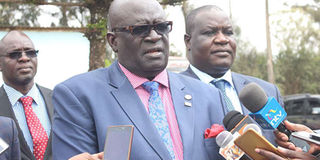Duplication of programmes a necessary evil

Education Cabinet Secretary George Magoha speaks to journalists after inspecting training of teachers on new curriculum, at Masaku School for the Physically Disabled in Machakos on August 21, 2019. He is against duplication of university programmes. PHOTO | NATION MEDIA GROUP
What you need to know:
- As it stands, universities have no way of telling with certainty the required training needs, and so each has been left to its own device.
The purge on unprogressive practices in local universities is under way.
True as fidelity is to fact, reforms are overdue. Such need an astute and brave personality such as Prof George Magoha.
Most importantly, they require balanced thoughts that evince Aristotle’s doctrine of the mean: Avoiding excess and deficiency, but seeking and choosing an intermediate position.
According to the Aristotelian theory, too much of something, however virtuous, becomes vicious. For instance, courage is a virtuous mean between cowardice (vice of deficiency) and rashness (vice of excess).
This is why resolute and well-intentioned personalities like Prof Magoha require the company of not only intelligent but candid people.
Whereas the latter’s intelligence will serve to help him polish whatever good ideas he may have, their candour will energise them to counsel the good professor truthfully.
DUPLICATED COURSES
There is a real possibility that those surrounding Prof Magoha may be coiling their tails whenever he looks around for their input. In him, they may be seeing Caesar’s wife who was beyond reproach.
This explains why they have remained mute on matters such as duplication of programmes in universities. On this, both the Ministry of Education and Commission for University Education have never spoken out unequivocally.
The last time I checked, Prof Magoha ridiculed the folly of opening new universities that offer programmes similar to existent ones. This implied that all universities which offer similar fields of study are guilty of duplication. And they are not few.
To put matters in perspective, we should interrogate the genesis of programme duplication.
First, it is worth noting that many universities worldwide — including the Ivy League — individually offer not only similar but several programmes.
Since we love comparing ourselves with Western countries, allow me to pick on the American-based Massachusetts Institute of Technology (MIT).
SKILLS DEFICIENCY
The fact that MIT is a technology-based institution has never stopped it from considering humanity courses.
In fact, it domiciles the School of Humanities, Arts and Social Sciences, where courses such as the locally vilified Anthropology and History fall. Duplication it is, since many other universities in the US offer similar courses.
Secondly, developing nations like Kenya face many challenges. On the lead is a deficiency in skilled human power. This has occasioned the mushrooming of colleges to take care of the void.
With challenges such as poor transport and communication networks, many universities took education close to the people so that they did not have to suffer the inconveniences of travelling all over in search of training.
For instance, some people needed to take part-time courses either in the evening or over the weekend. With devolution, this need would become more urgent.
Given the nature of our transport system, restricting particular programmes to particular universities would have been unreasonable.
Still, there are those who could not afford accommodation charges. Commuting therefore lessened their burden.
PRACTICALITY
Further, some programmes require hands-on application. For instance, students of medicine must be close to a medical facility for obvious reasons.
Assuming the University of Nairobi monopolised medicine, for example, this would imply that the adjacent facilities such as Kenyatta National Hospital bear the pressure of accommodating all the trainees — including those from medical training colleges. How practical would this be?
The same can be said of Education programmes where one university, say Kenyatta, would be granted the agony of training all teachers and following them up across the rugged terrain of Kenya during practicum.
I do not in any way mean to undermine the idea of universities identifying their niches. On the contrary, such a move must be considered against a wider spectrum of existential realities.
QUANTIFY NEEDS
Contemplation of a situation where every university will have its own unique programmes is laughable, and might lead to the creation of hollow idiosyncratic programmes in the name of compliance.
Such has been witnessed before when universities resorted to turning courses into full programmes complete with tongue-twister names.
Similarly, there exist cases where some universities and middle level colleges offer almost all programmes known on earth despite their lack of requisite resources; this should have been frowned upon yesterday.
A responsible government must protect her citizenry from such madness. Going forward, we need to map and quantify our personnel needs, both immediate and long term.
Thereafter, we should identify the means of developing them, and designate the institutions that will undertake such training.
DIGITAL DATABASE
Once done, all the information concerning the projected manpower needs, career prospects, institutional programmes and requirements should be hosted on a central digital platform where citizens can easily access and make informed choices.
The information should then be constantly revised and updated in line with new realities such as demographic trends (the national census is here with us) and professional dynamics.
With such direction, the government can rightfully order universities to discharge their mandate in line with her vision.
As it stands, universities have no way of telling with certainty the required training needs, and so each has been left to its own device.
Yet, the government could facilitate one of the institutions to carry out a research on the same. But the bottom line is, some programmes must be cut across all universities, however minimal.
Mr Osabwa is a lecturer, Alupe University College, Busia. [email protected]





